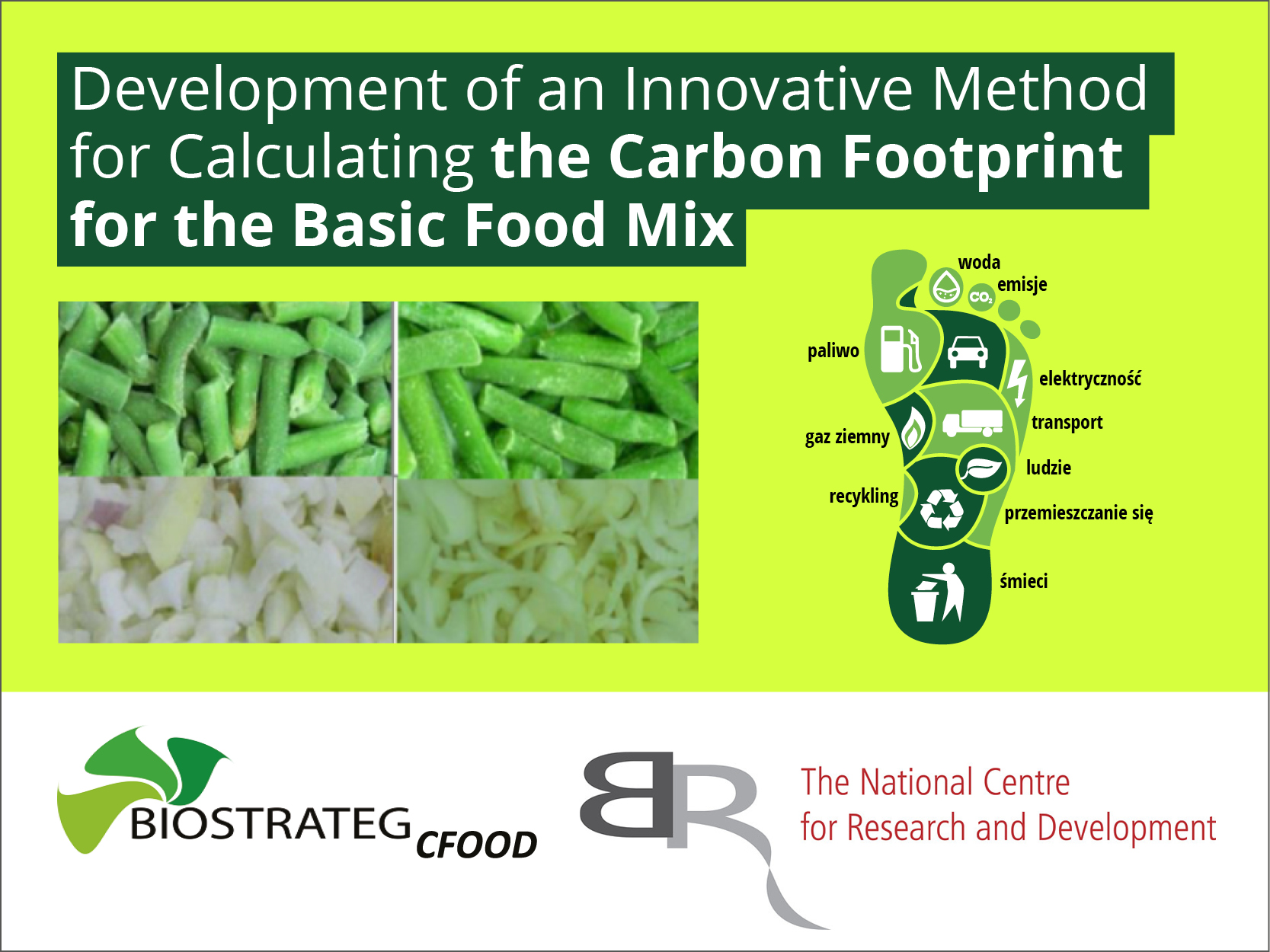Development of an Innovative Method for Calculating the Carbon Footprint for the Basic Food Mix
The subject of the project are research aimed at developing an innovative methodology of calculating the carbon footprint (CF) for a basic basket of frozen food, affecting the development of technologies to reduce the carbon footprint by using a full-valuable vegetable outgrades for the production of food products with increased health and nutritional values. The project is in line with current trends, supporting the trend of circular bioeconomy, i.e. economy in closed circulation (cycle), in accordance with the motto that „today’s waste will be tomorrow’s products”. Otherwise, the public will drown in the piles of rubbish. This is particularly true for the food industry, which is a conglomerate of many technologies: production, distribution, processing and storage of food, which has a significant impact on the environment. By using raw materials of both vegetable and animal origin, food production becomes an important contributor to the negative changes taking place in the natural environment. These changes are increasingly the subject of debates and social activities and the basis for consumer decisions. A wider group of consumers, apart from the criteria such as freshness, sensory features and health security, chooses products that have been produced in keeping with the requirements of environmental protection. To assess such impacts in the production and distribution of food, a carbon footprint (CF) can be used. This project is a response to environmental, economic, social and consumer problems related to:
– high emission of CO2 to the atmosphere by the food industry
– negative impact of production and storage processes on health benefits of food,
– management of large quantities of full-valuable vegetable and possibly fruity outgrades (production waste) for food production,
– low consumption of high nutritional and health food in society,
– lack of effective, universal and authoritative (i.e. based on real data) methodology for counting CF in food production.
The project will be implemented by an interdisciplinary scientific and industrial consortium in years 2018-2021, along with the preparation phase for implementation. As a result of the research project will be developed:
- an innovative method of calculating carbon footprint for frozen food products, ready for use in business as an expert system (CF Expert software),
- innovative production technologies for new frozen and lyophilizated products (vegaburgers, pastes and liobars) using a full-valuable multivegetable outgrades,
- a prototype of a technological line for the production of frozen food, especially vegaburgers, including the calculation of the carbon footprint according to the developed method.
These activities will ensure reduction of the negative impact on climate change of food production processes and rationalization and reduction of CO2 emissions to the atmosphere by the food industry. In addition, they will also contribute to increase in the management of nutritious food waste and public access to food products with high nutritional and health benefits. Implementation of the Project will therefore contribute to the achievement of specific objectives of the Biostrateg III Program, i.e. including: A) development of cooperation between research units with external entities, B) increasing the participation of Polish research teams in European research and innovation programs, C) stimulating activity in private sector research. The results of the project have a large commercial potential and constitute a breakthrough in the agri-food market, in particular the use of the innovative CF counting method for the production of new products is a novelty on a global scale.
The project will contribute to the development of knowledge about counteracting negative climate change and about safe and healthy food production technologies, taking into account the developed method of calculating the carbon footprint. Therefore, the project will be an interdisciplinary platform for cooperation between consortium members and, in the future, a training matrix for the qualification of high-class specialists and young researchers. The implementation of the project will enable the application in national and international projects, including HORIZON 2020. The developed technology is a system solution that will have a positive impact on the health of the society, thanks to increasing the share in the vegetable diet, while providing high-quality products in a fast and easy to prepare form. It can be used for the purposes of sustainable environmental and social development of the country and reduce the negative effects of civilization phenomena and climate change in the aspect of European low-carbon policy.


